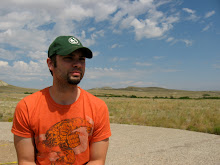 a lot of flack for is his inability to explain the discrepancy between so-called "legacy heroes" and "iconic heroes." He's had to deal with a fair amount of criticism by people who don't understand where he draws the line between the two. It's a fair complaint. He has been wildly unsuccessful in explaining himself, despite years of trying. It's pretty endearing, actually.
a lot of flack for is his inability to explain the discrepancy between so-called "legacy heroes" and "iconic heroes." He's had to deal with a fair amount of criticism by people who don't understand where he draws the line between the two. It's a fair complaint. He has been wildly unsuccessful in explaining himself, despite years of trying. It's pretty endearing, actually. But I don't think that his inability to put forward a compelling case means that he doesn't have one. DiDio seems to be trying to attach some in-story logic to the dictates of publishing and management. Barry Allen became the Flash not because he was inheriting the legacy of Jay Garrick, but because DC decided to relaunch The Flash with a new lead in a new costume and new villains. Hal Jordan became Green Lantern for the same reasons.

I think he's right to describe these two particular identities as having legacies. There have been six Flashes (Jay Garrick, Barry Allen, Wally West, John Fox, Jesse Chambers, and Bart Allen) and six Green Lanterns on Earth (Alan Scott, Hal Jordan, John Stewart, Guy Gardner, Kyle Rayner, and Jennifer-Lynn Hayden). And most of those characters weren't gimmicks. Just the girls, basically, which tells you something... Anyway, given the sheer number of stories about people other than the originals (Jay Garrick and Alan Scott), I think it's a reasonable statement to call Flash and Green Lantern "legacy heroes."
Where DiDio has been less clear is his case to take this storytelling technique and apply it to other DC super-heroes. He has argued that legacy is a key theme of the DCU. I think many fans disagree with this.
 DiDio's reading, I think, is based mostly on the characters from the Justice Society, whose increasing prominence has been one of DiDio's notable achievements. Nevertheless, there are far more DC super-heroes who haven't had multiple iterations than those who have. Bruce Wayne has always been Batman, Clark Kent has always been Superman...and we'll leave Wonder Woman out of this. There have been stories, even long-term arcs, where those characters have been replaced, but they have always returned sooner than later. And their return was always built into those stories. Just because Dick Grayson is going to become Batman in June doesn't mean that Batman is a legacy character. Bruce Wayne will be back, and everyone knows it. Grant Morisson has told us as much.
DiDio's reading, I think, is based mostly on the characters from the Justice Society, whose increasing prominence has been one of DiDio's notable achievements. Nevertheless, there are far more DC super-heroes who haven't had multiple iterations than those who have. Bruce Wayne has always been Batman, Clark Kent has always been Superman...and we'll leave Wonder Woman out of this. There have been stories, even long-term arcs, where those characters have been replaced, but they have always returned sooner than later. And their return was always built into those stories. Just because Dick Grayson is going to become Batman in June doesn't mean that Batman is a legacy character. Bruce Wayne will be back, and everyone knows it. Grant Morisson has told us as much. Bruce Wayne and Clark Kent are, obviously, iconic heroes. Their marketability and presence in the DCU are significant enough that it would be difficult to permanently (or as permanent as anything ever gets in super-hero comics) alter them to any substantial degree. DiDio has made the case that Barry Allen and Hal Jordan are the most iconic versions of those super-heroes as well. He has a pretty good case, I think. Whether or not you agree with bringing these characters back from the dead is an unrelated matter.
And this gets to the problem with DiDio's distinction between "legacy" and "iconic" heroes: it comes down to extra-textual factors. The distinctions between which characters are "legacy"

and which characters are "iconic" heroes (except Superman, Batman, and Wonder Woman) have little in-story logic. DiDio is trying to create some. Fair enough, though there are few themes that emerge as clearly as DiDio suggests from millions of comics published by thousands of writers and artists. The simpler reason, though, that DiDio has replaced the people under the masks of certain identities (Blue Beetle, Firestorm, the Question, the Atom) is the same reason Barry Allen became the Flash: DiDio wants to increase interest and demand for the characters his company publishes. They are not thematically determined legacy characters. They are legacy characters in that they are participating in DC's long-time strategy of replacing under-performing characters in order to try to increase their profitability.


No comments:
Post a Comment